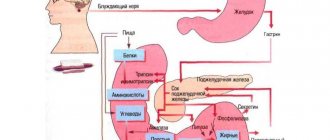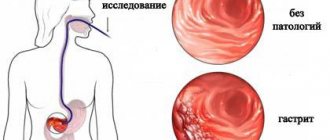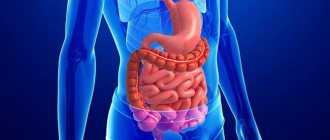Why is there a problem?
Temporary nausea and bitterness in the mouth, as a rule, are nothing more than the result of overeating the day before. So, these symptoms and weakness in the morning can be provoked by alcohol, peppery, fatty, fried foods eaten for dinner, marinades, smoked foods and other “aggressive” foods.
Nausea and bitterness in the mouth may have more serious (pathological) causes. The first “suspect” is biliary dyskinesia - muscle spasm leading to disruption of bile outflow. Bile stagnates, from time to time it is thrown into the esophagus along with particles of undigested food, causing discomfort in the oral cavity.
Other causes of bitterness in the mouth and nausea:
- infectious diseases of the upper respiratory tract;
- ulcers of the stomach, duodenum;
- inflammatory processes in the pelvic organs;
- bitterness in the mouth is a classic sign of almost all liver pathologies;
- long-term use of various groups of medications (primarily antibiotics);
- acid reflux (occurs also during pregnancy due to weakening of the gastric sphincter due to increased levels of prolactin in the blood).
If the patient feels sick, has a bitter taste in the mouth and has diarrhea, this set of symptoms may indicate poisoning (general intoxication) of the body with salts of heavy metals - cadmium, copper, lead, mercury. Your health may be aggravated by severe headaches, bloating, dry mouth, dizziness, and increased body temperature.
Hormonal changes in the female body during pregnancy are a common cause of the appearance of a bitter taste on the oral mucosa
Liver diseases that most often provoke nausea and bitterness in the mouth:
- hepatosis (dystrophic changes in hepatocytes - liver cells - under the influence of toxins that lead to dysfunction of this organ);
- hepatitis (liver inflammation of viral origin);
- cirrhosis (irreversible destruction of organ cells due to the replacement of parenchymal tissue with fibrous tissue).
Belching, diarrhea, bitter taste in the mouth, nausea and weakness are indicators of helminthiasis (parasitic activity of round and flatworms in certain internal organs). Nausea, heartburn, bitterness in the mouth in the morning are “sure signs” of pregnancy in women. The appearance of discomfort is associated with a weakening of the gastric sphincter and, as a result, the release of acid into the esophagus, as well as (at a later date) the pressure of the enlarged uterus on the stomach.
The constant presence of a bitter taste in the mouth can be a symptom of a number of dental diseases:
- stomatitis (viral, bacterial damage to the mucous membrane);
- glossitis (inflammation of the tongue);
- gingivitis (inflammatory process affecting the gums);
- The cause of discomfort may also be improperly fitted dentures or an allergic reaction to their metal elements.
Poor nutrition (unbalanced diet, an abundance of fatty and fried foods, alcohol abuse) is a factor that causes the development of diseases of the digestive tract and the appearance of dyspepsia (nausea, bitterness in the mouth, diarrhea, abdominal pain)
A bitter taste in the mouth and nausea can also be due to a violation of cerebral circulation (then the problem has a neurological basis), vascular spasm is certainly accompanied by the appearance of these symptoms, as well as general weakness, dizziness, fainting conditions, etc.
Causes of bitterness in the mouth after fatty foods
Let's consider common situations:
- Pain every morning - it is necessary to examine the biliary system.
- It is felt constantly - the cause may be chronic cholelithiasis, diseases of the hormonal system, malignant formations of the gastrointestinal tract.
- A pulling sensation during physical activity often indicates that the liver is not working properly.
- It goes away without taking therapeutic measures, the reason is taking medications that affect the functioning of the liver and affect the digestive tract.
- An unpleasant taste accompanied by bad breath indicates diseases of the oral cavity and gums.
Gastrointestinal diseases
Doctors identify a number of pathological conditions of the digestive organs, the presence of which causes an unpleasant taste sensation. Suitable pathologies: ulcer, gastritis, dyspepsia, gastroesophageal reflux disease (GERD). A bitter taste in the mouth is accompanied by heartburn and a feeling of heaviness after eating. Severe nausea, vomiting, and diarrhea are among the characteristic symptoms.
The disease is associated with poor motility of the gallbladder and bile ducts. Symptoms: pain in the hypochondrium, nausea after eating, bitter taste. With dyskinesia, a person feels a constant heaviness in the stomach.
Gastritis
The inflammatory process that disrupts the functioning of the stomach often develops asymptomatically, then heartburn, nausea and bitterness in the mouth appear among the first symptoms. During a doctor’s examination, a lot of information is conveyed by a person’s language – an important diagnostic method. With additional diagnostics, an endoscopist or gastroenterologist evaluates the condition of the mucous membrane, determines the type of inflammatory process and prescribes treatment. The standard course of treatment for gastritis lasts from two weeks to a month.
Pancreatitis
A disease characterized by the inability of the pancreas to produce sufficient amounts of enzymes necessary for digestion. The causes of pancreatitis include cholelithiasis, alcohol abuse, intoxication, stress, and injury. Often patients feel a bitter taste, a dull pain in the left hypochondrium, which makes them feel sick.
Pancreatitis disease
Poisoning
Intoxication with a toxic substance can be accompanied by nausea, dizziness, diarrhea and not always bitterness in the mouth.
Poor functioning of the thyroid gland can lead to hormonal imbalance, increased production of hormones that provoke muscle spasm, causing the reflux of bile into the esophagus. This causes bitterness in the mouth when stressed. If an unpleasant taste is felt regardless of nervous tension, and other causes are excluded, the symptoms indicate hyperfunction, dysfunction of the gland.
Sometimes a bitter taste indicates the development of inflammation in the oral cavity. The appearance of a symptom may indicate gum disease, poor oral hygiene; stomatitis can cause a bitter taste and odor from the mouth, the occurrence of ulcers, tissue swelling and cell death. Changes in taste often occur during allergic reactions.
Failure in the functioning of the gallbladder and ducts is caused by the inflammatory process of the organ and occurs as a result of the formation of stones - calculi. Does not allow bile to be properly removed from the bladder. In patients with chronic cholecystitis, body temperature often rises to subfebrile values of 37-38 degrees.
Cholecystitis disease
Parasites
Helminths, which can inhabit the intestines and destroy the mucous membrane, often cause a large number of gastrointestinal pathologies. Many parasites, attaching to the inner lining of the intestine, irritate the wall of the organ and disrupt the integrity of the mucous membrane. Causes disruption of digestive processes, increased formation of gases, and dysfunction of the digestive organs.
Patients infected with parasites are accompanied by constant weakness, dizziness, headache, and diarrhea. Giardia waste products can cause allergies. If parasites are the cause of bitterness, expelling helminths from the body is an acceptable way to eliminate the disease. The patient feels relief.
The cause of bitterness in the mouth after sleep in older adults may be a disorder of the liver. Symptoms also appear after eating. The causes of bitterness in the mouth after sweets make it possible to feel the problem more clearly.
This is not a normal state of affairs and when the first causes appear, you should immediately consult a doctor. The first person to tell about your problems is your family therapist, who, after several tests and interviews, will schedule visits to other doctors.
Which doctor should I contact if I have a bitter taste in my mouth? Most likely, see a gastroenterologist, neurologist or endocrinologist.
Improper nutrition leads to disturbances in the functioning of the body. The described symptoms immediately after eating appear when there are problems with the biliary system; special attention should be paid to the ducts. You should immediately adjust your diet and consult a doctor for further help.
Signs and diagnosis
To determine why the patient feels sick and has a bitter taste in the mouth, the doctor must analyze the accompanying manifestations. Their list includes:
Causes of rotten breath
- bloating and stomach pain;
- nausea;
- the appearance of bitterness in the mouth after vomiting;
- problems with stool (diarrhea, constipation);
- digestive disorders (discomfort in such cases occurs after eating);
- dizziness;
- increased gas formation;
- putrid odor from the mouth.
Dryness and bitterness in the mouth + attacks of nausea are “identifying signs” of gastritis (inflammation of the gastric mucosa). If belching is also added to these, we are talking about cholecystitis. The latter is accompanied by periodic spontaneous pain in the epigastrium and right hypochondrium. It is noteworthy that exacerbation of cholecystitis can be triggered by both increased stress or physical activity, and banal overeating.
Important! Any dyspeptic manifestations (nausea, vomiting, diarrhea, bitter taste on the oral mucosa, abdominal pain) in most clinical cases are aggravated by malfunctions of the hepatobiliary system (liver, biliary tract, gallbladder) and other gastrointestinal organs.
Thus, patients with such symptoms begin to have difficulty with “heavy” meals, lose their appetite, and may lose weight. Liver disorders can be “recognized” by the characteristic jaundice of the skin and mucous membranes - in combination with dyspepsia, jaundice indicates hepatitis, cirrhosis, hepatosis and other serious pathologies. Bitterness and nausea after eating are a sign of the following digestive disorders: gastroduodenitis, problems with intestinal motility (spasmodic nature), colitis, enterocolitis.
Diagnosis for persistent bitterness and nausea includes:
- examination, analysis of patient complaints, history taking;
- palpation of the epigastrium, right hypochondrium, gallbladder;
- fibrogastroduodenoendoscopy (instrumental examination of the esophagus, duodenum and stomach);
- general, clinical analysis of blood, urine;
- ultrasound of the abdominal organs;
- if hepatitis is suspected, liver tests;
- pH-metry (allows you to determine the level of stomach acidity);
- for diseases of the oral cavity - a dental examination.
Patient examination plan
The specific examination plan depends on the clinical symptoms and is determined individually. In most cases, to clarify the diagnosis you need:
- examination and palpation of the right hypochondrium area;
- fibrogastroduodenoscopy – examination of the upper gastrointestinal tract;
The main procedure for diagnosing gastrointestinal pathologies is esophagogastroduodenoscopy.
- clinical tests of urine, feces and blood;
- blood biochemistry;
- Ultrasound of the liver;
- retrograde cholangopancreatography;
- endoscopic retrograde cholangiopancreatography;
- liver biopsy.
Solution
Treatment of bitterness, nausea and other associated symptoms depends on the cause of their occurrence. It happens that it is enough to adjust the diet, not overload the digestive organs and establish a drinking regime, and the discomfort disappears by itself.
Diagnosis of the causes of nausea and bitterness in the mouth involves taking a medical history, analyzing complaints and examining the patient, as well as a whole range of instrumental and laboratory tests
For diseases of the pancreas, intestines, and duodenum, patients are prescribed the following medications:
- Pancreatin (enzymatic drug, has a positive effect on digestive function);
- Furazolidone (antibacterial tablets, taken after meals, normalize the state of intestinal microflora);
- Omeprozole is recommended for ulcerative lesions of the duodenum and stomach;
- the medicinal group of hepatoprotectors allows you to prevent further pathological changes in liver cells and restore already “damaged” hepatocytes.
Enterosorbents (drugs that bind and remove toxins from the body), as well as probiotics (“useful” intestinal bacteria) are integral components of drug therapy for bitterness in the mouth and attacks of nausea. For dyskinesia and other problems with the gallbladder or liver diseases, it is useful to take choleretic herbal teas (sold in pharmacies).
Important! In some clinical cases (for example, with cholelithiasis), patients with nausea, bitterness in the mouth, and abdominal pain may require surgical intervention.
Where does the sudden bitterness in the mouth come from?
- Inflammatory processes in the gums and oral mucosa
- A special reaction to dental treatment, especially after prosthetics
- Development of gastritis and other inflammations in the stomach
- Diseases of the duodenum
- Lower esophageal disease (GERD)
- Disorders of gastric contraction function
- Intestinal diseases caused by various infections
- Pathogenic disorder of intestinal microorganisms
- Various types of gallbladder diseases
- Chronic liver diseases, which include hepatitis and cirrhosis
- Hormonal imbalances
- Diabetes
- Anemia
- Pregnancy status
- Use of certain medications
- Poisoning of the body
- Heavy metal intoxication
- Long smoking history
- Quitting bad habits associated with smoking
- Any stressful situations
Bitterness is accompanied by various additional symptoms. An accurate diagnosis can only be made in a clinical setting. However, the first symptoms can be recognized at home.
Prevention
To avoid discomfort, it is recommended, first of all, to make adjustments to your own diet and diet. So, it is better to give up sweets, baked goods, fatty and fried foods, alcohol, as well as products containing large amounts of dyes, preservatives and other synthetic additives. The daily menu should be filled with fiber, cereals, lean fish, meat, vegetable broths - such a diet will restore the “affected” functions of the gastrointestinal tract as soon as possible.
Since a bitter taste in the mouth often “haunts” smokers and those who abuse alcohol, giving up bad habits is also on the list of mandatory preventive measures. The daily fluid intake (pure water, natural juices, fresh compotes, fruit drinks) should be 2–2.5 liters. This will ensure healthy functioning of the digestive tract and have a positive effect on metabolism in general.
To combat nausea and bitterness, patients are prescribed a diet, symptomatic drug treatment, and, if indicated, surgery.
Timely treatment of chronic and acute diseases (primarily infectious lesions of the oral cavity, upper respiratory tract, gastrointestinal tract) will also prevent the occurrence of discomfort. Due to the fact that nausea and bitterness in the mouth can have not only physiological (overeating, pregnancy, intoxication), but also pathological causes (diseases of the liver and other digestive organs, dental problems), if discomfort persists for a long time, you should seek help from a doctor , be examined and undergo appropriate treatment.
Etiology
A large number of predisposing factors, which are not always harmless, can provoke the appearance of a bitter taste in the mouth.
If such manifestations appear in a person quite rarely, then very often this indicates not the presence of pathology, but physiological processes, in particular:
- binge eating;
- consumption of large quantities of fatty and spicy foods;
- the body's reaction to drinking alcoholic beverages;
- poisoning of the body with metals, this may be indicated by a specific symptom - the taste of bile in the mouth;
- indiscriminate use of antibiotics or antihistamines;
- pregnancy - during this period of life, the fairer sex experiences hormonal changes, and the appearance of symptoms may be due to active intrauterine growth of the fetus, which, in turn, leads to displacement or compression of some internal organs. In addition, the appearance of such symptoms is often the first sign that a woman is preparing to become a mother. It follows that bitterness in the mouth and nausea are completely normal symptoms for a pregnant woman;
- unscrupulous compliance with the rules of oral hygiene. If you do not brush your teeth twice a day, this will lead to the proliferation of pathogenic microflora.
But in most cases, the expression of such symptoms indicates that a person has pathology of the digestive system and liver. Pathological conditions include:
- disruption of intestinal functioning is one of the most important factors in the occurrence of such unpleasant manifestations;
- liver diseases, such as hepatitis, hepatosis or cirrhosis. Quite a lot of people are convinced that if a bitter taste and nausea are not accompanied by jaundice of the skin and mucous membranes, then there is no point in suspecting diseases of this organ;
- duodenal or gastric ulcer;
- gastroduodenitis;
- the presence of lamblia or other parasites in the body;
- the course of the inflammatory process in the gallbladder;
- Dysgeusia is one of the types of taste disorders, which is caused by impaired functioning of taste buds;
- GERD – with this disease, gastric juice backflows into the esophagus. This process always causes heartburn, which is almost always accompanied by a bitter taste;
- diseases of the teeth and gums, which almost always cause bitterness. But also a similar sign may appear immediately after dental prosthetics, against the background of the patient’s increased sensitivity to any component;
- enterocolitis and colitis;
- bile duct dyskinesia.
Sometimes the appearance of a bitter taste in the mouth and nausea is caused by eating certain foods, namely:
- nuts;
- strong tea or coffee;
- confectionery and flour products;
- fatty meats, poultry and fish;
- pasta;
- potatoes;
- a lot of chocolate;
- carbonated and alcoholic drinks.
Doctors recommend completely avoiding such ingredients if a person notices the appearance of bitterness and nausea after consuming them. At the same time, it is worth considering that each organism is individual and what will cause similar symptoms in some will not lead to any changes in others.
It should be noted that nausea and bitterness are closely related. This is explained by the fact that constant nausea often ends in vomiting, which, in turn, causes bitterness in the mouth.
Treatment of bitterness in the mouth with folk remedies
All methods of disease are based on the causes that characterize the disease. When treating bitterness in the mouth with medications, use Omez, Urosan, Allohol. All these drugs are taken only as indicated. Self-medication can lead to undesirable consequences. The symptom itself cannot be treated, since it has a primary cause to which treatment measures must be directed.
Of great importance is a therapeutic diet for bitterness in the mouth, which is aimed at stabilizing the functioning of the gastrointestinal tract. Treatment can be prescribed only after the exact cause of the symptom has been established.
- Traditional methods show little effectiveness in the fight against serious diseases of internal organs. A small improvement is achieved by temporarily improving the upper esophagus
- Folk remedies temporarily eliminate the appearance of bitterness in the mouth, but it should be understood that complete relief from the disease that led to this symptom is only possible with the use of traditional medicine
- For treatment, it is recommended to use special gargles and herbal decoctions that are taken orally. For rinsing, you can use mint, lemon balm and thyme. These herbs are crushed and added in a ratio of 3:2:1 in order
- The collection is poured with boiling water at the rate of one glass per one tablespoon of dry mixture. The drug should sit for at least two hours, then the broth should be strained and used for rinsing every time there is a feeling of bitterness in the mouth
For oral administration, an infusion containing flax seeds is used. They are crushed and infused in boiling water. Over time, the infusion will take on the appearance of jelly, after which you can drink it, no more than one sip at a time and no more than one glass per day. Also effective are decoctions of rose hips, chamomile, viburnum and hawthorn.
To get rid of such symptoms, first of all, a diet will allow you to avoid such foods:
- fatty and fried foods;
- fatty meats and fish, as well as broths prepared on their basis;
- garlic and horseradish;
- smoked meats and marinades;
- chocolate and cocoa;
- carbonated drinks and confectionery.
In addition, patients are advised to follow some nutritional rules:
- eat often, but in small portions;
- chew foods thoroughly;
- prepare dishes only by steaming, boiling, baking and stewing ingredients;
- monitor the temperature of the food. Food should not be too cold or too hot.
Drug therapy is strictly individual in nature and is based on the disease that caused nausea and bitterness. There are several basic medications:
- PPI;
- gastroprotectors;
- antibacterial substances;
- antiemetics and antipyretics;
- antispasmodics;
- antacids.
Therapy using folk remedies, which includes the use of decoctions and infusions, shows good results:
- mint and lemon balm;
- chamomile and thyme;
- calendula and oregano;
- dill and fennel;
- rosemary and anise;
- rose hips and viburnum;
- vegetable juices.
Surgical intervention is a last resort, for which there must be serious reasons, namely, the ineffectiveness of conservative treatment, the patient’s serious condition or serious pathology, which has become a source of bitterness in the mouth and nausea.
Symptoms
The manifestation of the clinical picture will differ depending on what was the source of the appearance of the main symptoms.
Symptoms of nausea and bitter taste may be accompanied by such manifestations as:
- increase in abdominal size;
- bowel dysfunction with a predominance of constipation or diarrhea;
- severe pain of various localization depending on the affected organ;
- attacks of headache and dizziness;
- belching with a sour smell;
- heartburn;
- a feeling of heat and burning in the chest area, which can spread along the esophagus and into the pharynx;
- the appearance of characteristic rumbling in the stomach;
- general weakness combined with nausea and a bitter taste often worries the fairer sex during pregnancy. To eliminate them, a woman only needs to adjust her diet;
- dry mouth - is a consequence of prolonged use of medications;
- yellowness of the skin, as well as the mucous membranes of the eyes and mouth;
- increase in body temperature.
It is worth considering that these are only general symptoms that may differ depending on the nature of the disease.
Bitterness in the mouth and pain in the right hypochondrium
If discomfort in the mouth is accompanied by headaches, you need to check your blood pressure. Most often, symptoms indicate a decrease in blood pressure. This may also make you feel dizzy.
A decrease in blood pressure in such cases is not caused by disturbances in the functioning of the cardiac system, but by diseases such as stomach ulcers, hepatitis, tuberculosis or diabetes mellitus. Similar symptoms also occur with alcohol abuse. The cause of bitterness in the mouth after alcohol may be liver disease.
Destabilization of the stomach and esophagus, disruption of the functional activity of these organs. Characteristic accompanying symptoms are severe bloating and heartburn. Bitterness in the mouth and yellow saliva most often appears with similar diseases that are associated with high acidity.
A comparison of these symptoms, together with abdominal pain and intestinal spasms, gives reason to draw a conclusion about gallbladder diseases. Urgent consultation with a doctor is required. Additionally, a runny nose and dizziness may occur. Bitterness in the mouth after exercise may be associated with gallbladder disease.
Gastric irritation syndrome. Most often, symptoms appear literally immediately after eating. It is recommended to reconsider your diet. In other cases, these symptoms are associated with diseases of the gastrointestinal tract. There may be a bitterness in the mouth and a metallic taste.
In this case, women are advised to consult a gynecologist. All patients most likely have diseases of the spleen or pancreas. Possible pathologies of the left kidney. Often the cause may be an ulcer, gastritis or pancreatitis. There may be a sweet bitterness in the mouth or a sour taste. Bitterness in the mouth after poisoning, vomiting, loose stools often gives off pain in the left hypochondrium.
General disorder of the biliary system. The pain is pressing, but not sharp. Additionally, there is increased fatigue, depression, bad mood and loss of appetite.
Bitterness in the mouth with cholecystitis is associated with pain in the hypochondrium. This disease can cause a constant bitter taste in the mouth. Bitterness in the mouth after gallbladder removal is common.











